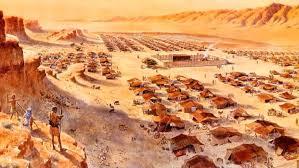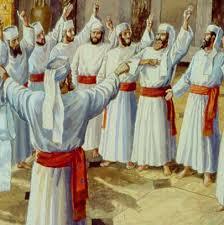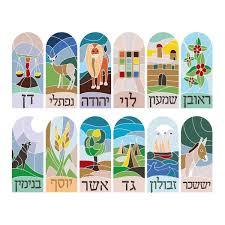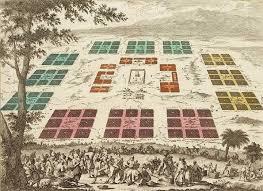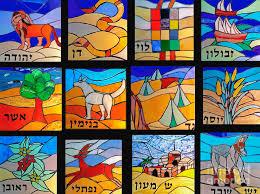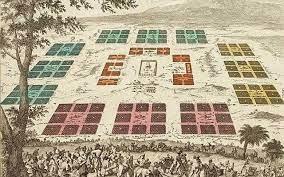Fo – यीशु ने राजनीतिक मसीहा के विचार को अस्वीकार कर दिया मत्ती १४:२२-२३; मरकुस ६:४५-४६; यूहन्ना ६:१४-१५
यीशु ने राजनीतिक मसीहा के विचार को अस्वीकार कर दिया
मत्ती १४:२२-२३; मरकुस ६:४५-४६; यूहन्ना ६:१४-१५
खोदाई: लोगों ने ऐसा क्यों सोचा कि यीशु व्यवस्थाविवरण १८ के भविष्यद्वक्ता थे? परिणामस्वरूप, उनकी योजनाएँ क्या थीं? वास्तव में वह असंभव क्यों था? हम यहां येशुआ को उसकी मानवता में कैसे देखते हैं? चमत्कार के बाद सर्प ने प्रभु को कैसे प्रलोभित किया? प्रभु ने उनका प्रस्ताव क्यों अस्वीकार कर दिया? येशु को स्वर्ग में कब ले जाया जाएगा?
चिंतन: यदि मसीह को अक्सर आध्यात्मिक और शारीरिक विश्राम की आवश्यकता होती है, तो क्या आपको भी उसी चीज़ की आवश्यकता नहीं है? आप परमेश्वर के साथ अकेले रहने के लिए कहाँ जाते हैं? क्या आप यीशु को उसकी शर्तों पर या अपनी शर्तों पर अपने जीवन का राजा बनाना चाहते हैं?
जब लोगों ने यीशु द्वारा किए गए चमत्कार को देखा, तो वे कहने लगे, “निश्चित रूप से यह वह भविष्यद्वक्ता है जो दुनिया में आने वाला है।” तुरंत यीशु ने प्रेरितों को बेथसैदा जूलियस की नाव में बिठाया और गलील सागर के दूसरी ओर गेनेसेरेट तक जाने के लिए कहा (देखें Fq– गेनेसेरेट में यीशु का स्वागत)। यीशु ने यह जानते हुए कि वे आकर उसे बलपूर्वक राजा बनाना चाहते थे, भीड़ को हटा दिया और पीछे हट गये। वह प्रार्थना करने के लिए अकेले ही एक पहाड़ी पर चढ़ गया। बाद में उस रात वह वहाँ अकेला था (मती १४:२२-२३; मरकुस ६:४५-४६; यूहन्ना ६:१४-१५)।
जब पाँच हज़ार पुरुषों, औरतों और बच्चों को खाना खिलाया गया और बचे हुए भोजन की बारह टोकरियाँ उठाई गईं, तो लोगों ने कहा: निस्संदेह यही वह भविष्यद्वक्ता है जो दुनिया में आने वाला है। जिस भविष्यवक्ता के बारे में वे बात कर रहे थे वह १८:१५ और १८ के व्यवस्थाविवरण में से एक है। मूसा ने भविष्यवाणी की थी कि उसके जैसा एक भविष्यवक्ता उठेगा और लोग उसकी बात सुनेंगे। गलील में यहूदी यीशु को भविष्यवाणी की पूर्ति और मसीहा साम्राज्य की स्थापना के रूप में देखते थे। उनके स्वर्गारोहण के बाद, प्रेरितों ३ में पतरस और प्रेरितों ७ में स्टीफ़न ने इस भविष्यवाणी की पूर्ति के रूप में येशुआ हा-मशियाक का उल्लेख किया।
मसीहा जानता था कि बड़ी भीड़ में आने और उसे अपने तरीके से और अपने उद्देश्यों के लिए, यदि आवश्यक हो तो बलपूर्वक राजा बनाने की अदम्य इच्छा थी। यदि यीशु ने उनकी इच्छाओं के आगे घुटने टेक दिए होते, तो रोमनों ने निश्चित रूप से विद्रोह को दबा दिया होता और यीशु को राजद्रोह के लिए क्रूस पर चढ़ा दिया होता। लेकिन प्रभु की मृत्यु का अपना समय और अपना उद्देश्य था। वह गलील में नहीं, यरूशलेम में मरेगा। और वह पूरी तरह से नियंत्रण में होगा: मेरे पिता मुझसे प्यार करते हैं इसका कारण यह है कि मैं अपना जीवन दे देता हूं – केवल इसे फिर से लेने के लिए। कोई उसे मुझ से छीन नहीं लेता, परन्तु मैं अपनी इच्छा से उसे छोड़ देता हूं। मेरे पास इसे छोड़ने का अधिकार है और इसे फिर से लेने का अधिकार है। यह आदेश मुझे अपने पिता से मिला (यूहन्ना १०:१७-१८)।
तथ्य यह है कि येशुआ ने अपने साथी को नाव में बिठाया था, यह दृढ़ता से सुझाव देता है कि वे उसे छोड़ने के लिए अनिच्छुक थे और शायद इसके बारे में उसके साथ बहस की थी। लेकिन वह स्पष्ट रूप से उन्हें काफी समझाने-बुझाने वाला था और उन्होंने उसकी बात मानी। वह नहीं चाहते थे कि उनका साथी संक्रमित हो और किसी भी राष्ट्रवादी विस्फोट में फंस जाए। वह इसे आते हुए देख सकता था और गलील क्रांति का केंद्र था। इसलिये यीशु ने उनसे कहा, कि जब तक वह भीड़ को विदा करे, तब तक गलील झील के उस पार बैतसैदा को उसके आगे आगे बढ़ें। यह झील के उत्तरी सिरे पर एक छोटी यात्रा थी, जिसे प्रेरितों ने कई बार किया था।
बिना लड़ाई या धूमधाम के, मसीहा ने बस भीड़ को विदा कर दिया, और वे गलील सागर के उत्तर-पश्चिमी तट से कुछ मील की दूरी पर, बेथसैदा जूलियस के पास, जहाँ भी वे कर सकते थे, रात के लिए सो गए। अब प्रेरितों की उपस्थिति की तुलना में भीड़ को भगाना आसान हो गया था। यह एक दुखद तथ्य था कि बारह अभी तक मसीहा और उसके साम्राज्य के वास्तविक चरित्र के बारे में स्पष्ट दृष्टिकोण नहीं रख पाए थे।
 उन्हें विदा करने के बाद वह पीछे हट गया, और प्रार्थना करने के लिए अकेले एक पहाड़ी पर चढ़ गया। बाद में उस रात, वह वहाँ अकेला था और अभी भी अपने स्वर्गीय पिता के साथ बातचीत कर रहा था। मसीह स्पष्ट रूप से परमेश्वर का पुत्र है, लेकिन उतना ही स्पष्ट रूप से मनुष्य का पुत्र भी है। वास्तव में, उनके दिव्य स्वभाव और उनके मानवीय स्वभाव दोनों का रहस्योद्घाटन अक्सर साथ-साथ देखा जाता है जैसा कि हम यहां देखते हैं। एक बिंदु पर, हम उसे अपनी मसीहाई शक्तियों से रोटियाँ बढ़ाते हुए देखते हैं। फिर भी, इसके तुरंत बाद, हम उसी मसीहा को व्यक्तिगत प्रार्थना के लिए और, इसमें कोई संदेह नहीं, भीड़ से छुट्टी पाने के लिए एकांत स्थान पर जाते हुए पाते हैं।
उन्हें विदा करने के बाद वह पीछे हट गया, और प्रार्थना करने के लिए अकेले एक पहाड़ी पर चढ़ गया। बाद में उस रात, वह वहाँ अकेला था और अभी भी अपने स्वर्गीय पिता के साथ बातचीत कर रहा था। मसीह स्पष्ट रूप से परमेश्वर का पुत्र है, लेकिन उतना ही स्पष्ट रूप से मनुष्य का पुत्र भी है। वास्तव में, उनके दिव्य स्वभाव और उनके मानवीय स्वभाव दोनों का रहस्योद्घाटन अक्सर साथ-साथ देखा जाता है जैसा कि हम यहां देखते हैं। एक बिंदु पर, हम उसे अपनी मसीहाई शक्तियों से रोटियाँ बढ़ाते हुए देखते हैं। फिर भी, इसके तुरंत बाद, हम उसी मसीहा को व्यक्तिगत प्रार्थना के लिए और, इसमें कोई संदेह नहीं, भीड़ से छुट्टी पाने के लिए एकांत स्थान पर जाते हुए पाते हैं।
वहां, येशुआ को प्रलोभन के ज्वार को रोकने और क्रांतिकारी लोकप्रियता की लौ को बुझाने के लिए पिता के साथ संवाद करने की ताकत मिलेगी, जब वह अगले दिन फिर से लोगों के बीच में होंगे। संकट बढ़ रहा था. उसकी बाकी राह सचमुच कांटेदार होगी, क्योंकि उसे भीड़ का अलगाव सहना पड़ेगा और प्रशंसा की आवाजें निराशा और अपने खिलाफ कड़वाहट में बदल जाएंगी।
यीशु का प्रलोभन न तो उसके बपतिस्मे के तुरंत बाद जंगल में उन तीनों के साथ शुरू हुआ और न ही समाप्त हुआ (देखें Bj– यीशु ने जंगल में परिक्षित हुए)। उस समय के अंत में, प्राचीन सर्प केवल अधिक उपयुक्त समय तक उससे दूर चला गया (लूका ४:१३ एनएएसबी)। उसे राजा बनाने के लिए भीड़ और प्रेरितों का उत्साह जंगल में तीसरे प्रलोभन के समान था, जिसमें, प्रतिद्वंद्वी ने यीशु को दुनिया के सभी राज्यों और उनके वैभव की पेशकश की थी (मती ४:८)। यह ऐसा है मानो शैतान ने पूछा हो, “अपने सभी उत्साही समर्थकों के साथ फसह के मौसम से बेहतर अपना राज्य स्थापित करने का क्या समय हो सकता है?” लेकिन स्वर्ग में ले जाए जाने के लिए ईश्वर द्वारा दिए गए समय पर, यीशु दृढ़तापूर्वक येरूशलेम के लिए निकल पड़े (लूका ९:५१)।
रात को पहाड़ पर प्रार्थना में लीन एकांत व्यक्ति का दृश्य दिखाई दिया। यह मसीहा के नीचे समुद्र पर एक तूफ़ानी रात थी, जिस पर कहीं न कहीं उसके शिष्य प्रचंड लहरों के साथ चप्पुओं और पालों पर संघर्ष कर रहे थे। लेकिन उन तत्वों की तुलना में कुछ भी नहीं, जो उसकी आत्मा के भीतर क्रोधित थे, जब उसने युहन्ना बप्तिजक की मृत्यु और उसके स्वयं के अंतिम कड़वे संघर्ष के दिन के बारे में सोचा था, जो उसकी अपनी मृत्यु को क्रूस पर लाएगा।



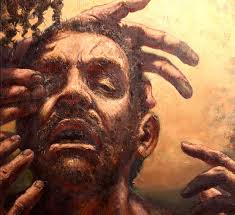 तब स्वयं-घोषित विश्वास उपचारकों के साथ इतनी आम धूमधाम या सतही नाटक के बिना, उसने बस उनकी आँखों को छुआ और कहा:
तब स्वयं-घोषित विश्वास उपचारकों के साथ इतनी आम धूमधाम या सतही नाटक के बिना, उसने बस उनकी आँखों को छुआ और कहा: 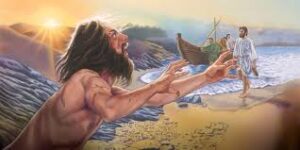 वे अभी उतरे ही थे कि पास की कब्रों से उग्र पागलपन और मानवीय संकट की खून जमा देने वाली चीखें सुनाई देने लगीं। चंद्रमा की मंद रोशनी में उन्होंने दो दुष्टात्माओं से ग्रस्त व्यक्तियों को कब्रों से यीशु से मिलने के लिए आते देखा। मत्ती हमें बताता है कि दो आदमी कब्रों से बाहर आए (मत्तीयाहू ८:२८बी), लेकिन मरकुस और लूका ने दो लोगों में से अधिक प्रभावशाली पर ध्यान केंद्रित करना चुना (लूका ८:२७ए; मरकुस ५:२-३ए)। यह ध्यान रखना महत्वपूर्ण है कि येशुआ ने कभी किसी को बीमारी होने या किसी राक्षस द्वारा नियंत्रित होने के लिए दोषी नहीं ठहराया। उन्होंने माना कि वे अपने नियंत्रण से परे शक्तियों के शिकार थे और उन्हें प्रोत्साहन या निंदा की नहीं, बल्कि मुक्ति की आवश्यकता थी।
वे अभी उतरे ही थे कि पास की कब्रों से उग्र पागलपन और मानवीय संकट की खून जमा देने वाली चीखें सुनाई देने लगीं। चंद्रमा की मंद रोशनी में उन्होंने दो दुष्टात्माओं से ग्रस्त व्यक्तियों को कब्रों से यीशु से मिलने के लिए आते देखा। मत्ती हमें बताता है कि दो आदमी कब्रों से बाहर आए (मत्तीयाहू ८:२८बी), लेकिन मरकुस और लूका ने दो लोगों में से अधिक प्रभावशाली पर ध्यान केंद्रित करना चुना (लूका ८:२७ए; मरकुस ५:२-३ए)। यह ध्यान रखना महत्वपूर्ण है कि येशुआ ने कभी किसी को बीमारी होने या किसी राक्षस द्वारा नियंत्रित होने के लिए दोषी नहीं ठहराया। उन्होंने माना कि वे अपने नियंत्रण से परे शक्तियों के शिकार थे और उन्हें प्रोत्साहन या निंदा की नहीं, बल्कि मुक्ति की आवश्यकता थी।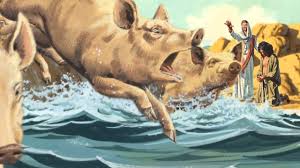 और सारा झुण्ड, जो लगभग दो हजार की संख्या में था, गलील झील के किनारे से उतरकर पानी में डूब गया (मत्ती ८:३२बी; मरकुस ५:१३बी; लूका ८:३३बी)। कुछ लोगों ने येशुआ के संबंध में एक नैतिक प्रश्न उठाया है क्योंकि उसने राक्षसों को सूअरों में प्रवेश करने की अनुमति दी, जिससे हानिरहित जानवरों को उनके मालिक की संपत्ति के साथ नष्ट कर दिया गया। परन्तु परमेश्वर ने अदन की वाटिका से शैतानी अभिव्यक्ति को उसके बुरे परिणामों के साथ अनुमति दी है। अय्यूब ने पूछा क्यों, और यहोवा ने संकेत दिया कि शैतानी शक्तियों के साथ उसके व्यवहार को इस समय हमारे द्वारा पूरी तरह से नहीं समझा जा सकता है (अय्यूब ४०-४१)। सूअरों की सामूहिक आत्महत्या ने साबित कर दिया कि राक्षसों ने वास्तव में उस व्यक्ति को छोड़ दिया और साथ ही उसकी नीचे वर्णित स्थिति भी छोड़ दी।
और सारा झुण्ड, जो लगभग दो हजार की संख्या में था, गलील झील के किनारे से उतरकर पानी में डूब गया (मत्ती ८:३२बी; मरकुस ५:१३बी; लूका ८:३३बी)। कुछ लोगों ने येशुआ के संबंध में एक नैतिक प्रश्न उठाया है क्योंकि उसने राक्षसों को सूअरों में प्रवेश करने की अनुमति दी, जिससे हानिरहित जानवरों को उनके मालिक की संपत्ति के साथ नष्ट कर दिया गया। परन्तु परमेश्वर ने अदन की वाटिका से शैतानी अभिव्यक्ति को उसके बुरे परिणामों के साथ अनुमति दी है। अय्यूब ने पूछा क्यों, और यहोवा ने संकेत दिया कि शैतानी शक्तियों के साथ उसके व्यवहार को इस समय हमारे द्वारा पूरी तरह से नहीं समझा जा सकता है (अय्यूब ४०-४१)। सूअरों की सामूहिक आत्महत्या ने साबित कर दिया कि राक्षसों ने वास्तव में उस व्यक्ति को छोड़ दिया और साथ ही उसकी नीचे वर्णित स्थिति भी छोड़ दी।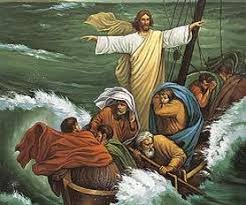 वह उठा, हवा को डाँटा, या उसका मुँह दबा दिया और प्रचण्ड लहरों से कहा:
वह उठा, हवा को डाँटा, या उसका मुँह दबा दिया और प्रचण्ड लहरों से कहा: 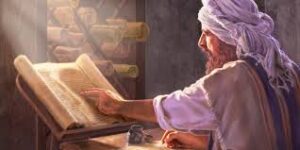 उनकी सकारात्मक प्रतिक्रिया के आधार पर, उसने उनसे कहा:
उनकी सकारात्मक प्रतिक्रिया के आधार पर, उसने उनसे कहा:  यहां जिस दूसरे प्रकार के
यहां जिस दूसरे प्रकार के  क्योंकि
क्योंकि 
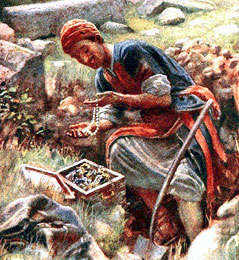 घर के अंदर ही ( देखने के लिए
घर के अंदर ही ( देखने के लिए 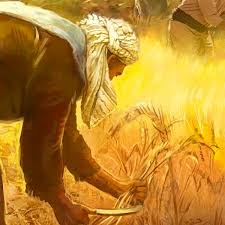 उस शाम किसी समय जब वे अंततः अकेले थे,
उस शाम किसी समय जब वे अंततः अकेले थे, 
